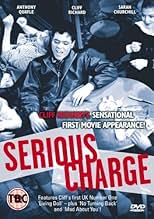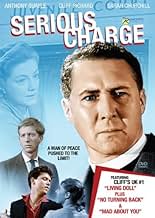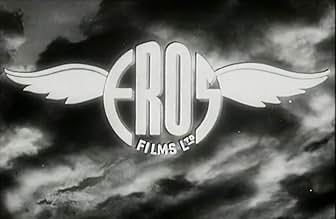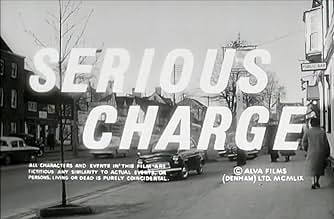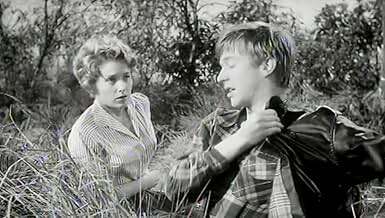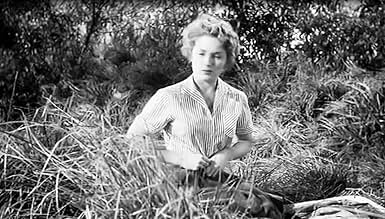Aggiungi una trama nella tua linguaA vicar falsely accused of assaulting a youth attempts to prove his innocence and save his reputation.A vicar falsely accused of assaulting a youth attempts to prove his innocence and save his reputation.A vicar falsely accused of assaulting a youth attempts to prove his innocence and save his reputation.
- Regia
- Sceneggiatura
- Star
Jess Conrad
- Dancer
- (non citato nei titoli originali)
Marie Devereux
- Sexy Girl in Coffee Bar
- (non citato nei titoli originali)
Carol Dourof
- Dancer
- (non citato nei titoli originali)
Recensioni in evidenza
An unmarried vicar in a new parish (Quayle) accuses a local 19 year old of being partially responsible for the death of a teenage girl. In defiance, the young man claims the vicar molested him. Out of spite, his story is backed up by a local woman (Churchill) still furious that the vicar rejected her advances. Unfortunately for the vicar, the woman is a highly respected member of the community - her father is the previous clergyman.
Given that this film was released in 1959, its subject matter is pretty ground-breaking, especially for a British film. Yes, the depiction of disaffected youth hanging around coffee bars, breaking into swimming pools and grooving to Cliff Richard's Livin' Doll is a little clumsy (Richard is asked to do little in a secondary role other than sulk or croon), but in an era when folks weren't supposed to know about homosexuality (at least in the movies), this is quite a daring story, and occasionally quite subversive. We the audience are ever so slightly encouraged to wonder about Quayle's sexuality as he spurns the advances of a good churchy woman, seems oblivious to his sexy young French maid (!) and looks up to his strident mother (a wonderfully knowing performance by Irene Browne). Judith Furse's probation officer is also deliciously ambiguous...
So quite a grown up film then - a shame that these days it's probably only known for being Cliff's debut film.
Given that this film was released in 1959, its subject matter is pretty ground-breaking, especially for a British film. Yes, the depiction of disaffected youth hanging around coffee bars, breaking into swimming pools and grooving to Cliff Richard's Livin' Doll is a little clumsy (Richard is asked to do little in a secondary role other than sulk or croon), but in an era when folks weren't supposed to know about homosexuality (at least in the movies), this is quite a daring story, and occasionally quite subversive. We the audience are ever so slightly encouraged to wonder about Quayle's sexuality as he spurns the advances of a good churchy woman, seems oblivious to his sexy young French maid (!) and looks up to his strident mother (a wonderfully knowing performance by Irene Browne). Judith Furse's probation officer is also deliciously ambiguous...
So quite a grown up film then - a shame that these days it's probably only known for being Cliff's debut film.
Please don't read any re views with spoilers. The first hour of this film is pretty dull. The second half is something else and worth every minute.
A decent vicar has to contend with a group of bratty teens and an "old maid" who acts like he is the last gas station before the desert and is determined to land him as a husband. One wouldn't think these two situations would converge and get an innocent caring clergyman into serious trouble, but it did. It is rather shocking in fact.
Cliff Richard has a small role in this, but after all his surgeries it is difficult to be sure which character he plays. Also on hand is a busty, flash in the pan French teen actress.
Enjoy watching this poor dolt get out of this pickle!
A decent vicar has to contend with a group of bratty teens and an "old maid" who acts like he is the last gas station before the desert and is determined to land him as a husband. One wouldn't think these two situations would converge and get an innocent caring clergyman into serious trouble, but it did. It is rather shocking in fact.
Cliff Richard has a small role in this, but after all his surgeries it is difficult to be sure which character he plays. Also on hand is a busty, flash in the pan French teen actress.
Enjoy watching this poor dolt get out of this pickle!
This was the first film to deal with homosexuality in British cinema, and it is absurd as there is not one homosexual character in it. I say this, and without spoilers, that the Vicar might be, well, repressed but it is all such a muddle I ended up not caring. But disregarding this the acting is not bad and Anthony Quayle, Sarah Churchill and especially Irene Browne are excellent. Irene Browne, the Vicar's mother has the best lines in the film, and her voice alone commands attention. I will just say that the vicar falls into troubled waters and there is an attempt at showing homophobia and the human havoc it can cause. Andrew Ray attempts being convincing as a juvenile delinquent ( very attractive to 1950's audiences ) but of course to be disapproved of. Cliff Richard improbably plays another delinquent and ridiculously stops the film by singing ' Living Doll ' which was a hit at the time. All this sounds as if I do not like watching it, and that is not true. When I feel low I watch it just for the acting, and its enjoyable absurdity. And even Sarah Churchill transforms herself from being prudish, sexually repressed and drab into one of the best ( elegant ) seducers on film. I like watching her in anything. See it and smile and remember that this really is an imitation of life. I give it just 5 because the actors save the film from poor direction and an awful musical soundtrack.
I have only just seen this film on an obscure satellite channel. Way ahead of its time. It would not be out of place if it were remade today (without the awful version of "Livin' Doll"!) Does anyone know who played the youths in the film (apart from Cliff Richard and Andrew Ray) One looked like Nanette Newman and another like Bryan Forbes but they are not mentioned on this site. If it is them perhaps this film is where they met and fell in love.
One thing that struck me as I watched the film is that 46 years on nothing has changed, at least not for the better. A sad indictment on our society.
One thing that struck me as I watched the film is that 46 years on nothing has changed, at least not for the better. A sad indictment on our society.
Anthony Quayle plays a vicar who somehow manages to combine the role of vicar of a parish and professional footballer.He never seems to be doing any training.The fact that he is not married concerns his mother.She encourages a rather past it Sarah Churchill to make a pass at him.Meantime Quayle seems to have his hands full trying to run a youth club for which he really seems to have no aptitude or empathy whatsoever.He seems to make more enemies than friends.His troubles only begin when he rebuffs the advances made to him by Churchill.From thereon it is all downhill for him.Interesting film which preserves the attitudes of the time.Also little is directly said about the sexuality of Quayle' s character.
Lo sapevi?
- QuizThe song, "Living Doll" by Cliff Richard and The Shadows (as The Drifters) was released as a single (in a different arrangement) as a spin off from this film. It was a British #1, and was the top-selling song of 1959.
- Citazioni
Mrs. Phillips: Now, do let's sit down, Hester. You're taking to another woman, not one of those helpless males who can't discuss anything important or private without staring out of a window or looking confused.
Hester Peters: I don't wish to be rude...
Mrs. Phillips: You can, my dear, because I'm going to be extremely rude to you.
- ConnessioniFeatured in A Bit of Scarlet (1997)
- Colonne sonoreLiving Doll
by Lionel Bart
Cliff Richard song
Accompanied by The Shadows (as The Drifters) (uncredited)
I più visti
Accedi per valutare e creare un elenco di titoli salvati per ottenere consigli personalizzati
Dettagli
- Tempo di esecuzione
- 1h 27min(87 min)
- Colore
- Proporzioni
- 1.37 : 1
Contribuisci a questa pagina
Suggerisci una modifica o aggiungi i contenuti mancanti

